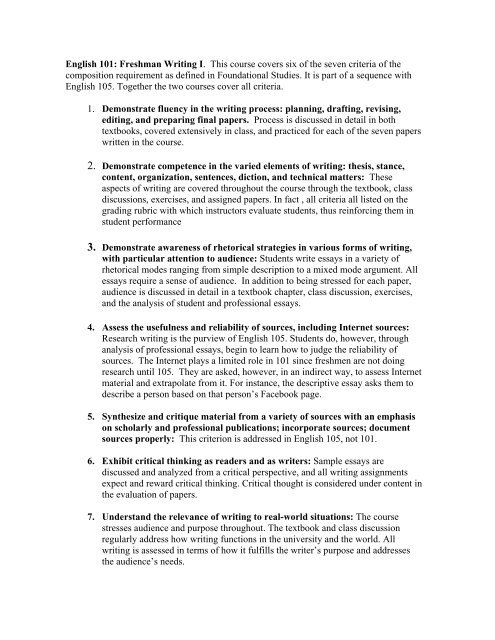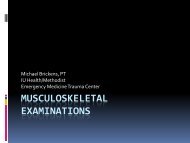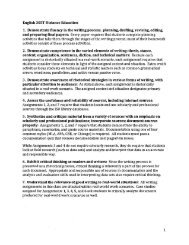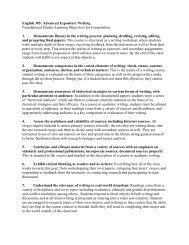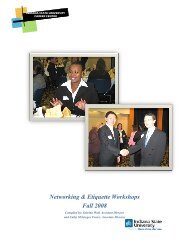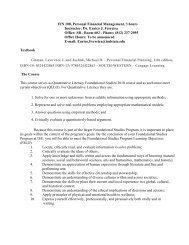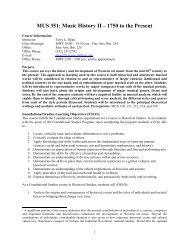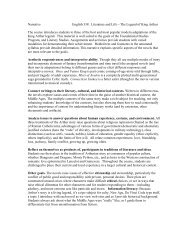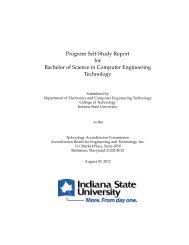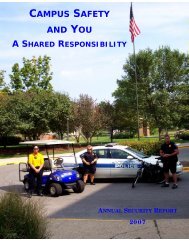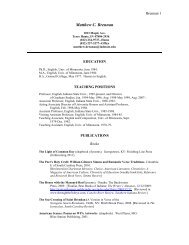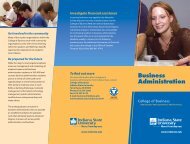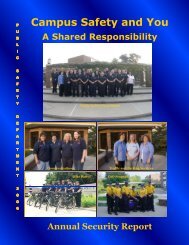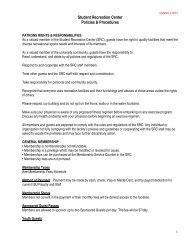ENG 101 - Indiana State University
ENG 101 - Indiana State University
ENG 101 - Indiana State University
You also want an ePaper? Increase the reach of your titles
YUMPU automatically turns print PDFs into web optimized ePapers that Google loves.
English <strong>101</strong>: Freshman Writing I. This course covers six of the seven criteria of the<br />
composition requirement as defined in Foundational Studies. It is part of a sequence with<br />
English 105. Together the two courses cover all criteria.<br />
1. Demonstrate fluency in the writing process: planning, drafting, revising,<br />
editing, and preparing final papers. Process is discussed in detail in both<br />
textbooks, covered extensively in class, and practiced for each of the seven papers<br />
written in the course.<br />
2. Demonstrate competence in the varied elements of writing: thesis, stance,<br />
content, organization, sentences, diction, and technical matters: These<br />
aspects of writing are covered throughout the course through the textbook, class<br />
discussions, exercises, and assigned papers. In fact , all criteria all listed on the<br />
grading rubric with which instructors evaluate students, thus reinforcing them in<br />
student performance<br />
3. Demonstrate awareness of rhetorical strategies in various forms of writing,<br />
with particular attention to audience: Students write essays in a variety of<br />
rhetorical modes ranging from simple description to a mixed mode argument. All<br />
essays require a sense of audience. In addition to being stressed for each paper,<br />
audience is discussed in detail in a textbook chapter, class discussion, exercises,<br />
and the analysis of student and professional essays.<br />
4. Assess the usefulness and reliability of sources, including Internet sources:<br />
Research writing is the purview of English 105. Students do, however, through<br />
analysis of professional essays, begin to learn how to judge the reliability of<br />
sources. The Internet plays a limited role in <strong>101</strong> since freshmen are not doing<br />
research until 105. They are asked, however, in an indirect way, to assess Internet<br />
material and extrapolate from it. For instance, the descriptive essay asks them to<br />
describe a person based on that person’s Facebook page.<br />
5. Synthesize and critique material from a variety of sources with an emphasis<br />
on scholarly and professional publications; incorporate sources; document<br />
sources properly: This criterion is addressed in English 105, not <strong>101</strong>.<br />
6. Exhibit critical thinking as readers and as writers: Sample essays are<br />
discussed and analyzed from a critical perspective, and all writing assignments<br />
expect and reward critical thinking. Critical thought is considered under content in<br />
the evaluation of papers.<br />
7. Understand the relevance of writing to real-world situations: The course<br />
stresses audience and purpose throughout. The textbook and class discussion<br />
regularly address how writing functions in the university and the world. All<br />
writing is assessed in terms of how it fulfills the writer’s purpose and addresses<br />
the audience’s needs.
English <strong>101</strong>: Freshman Writing Root Hall A112: 11:00-11:50 MWF<br />
Mary West<br />
Office: Root Hall, A 000, ext.0000<br />
E-mail: mwest@indstate.edu<br />
Office Hours: 9:00-10:00 MWF<br />
Other times by appointment.<br />
TEXTS:<br />
Carino, Peter. Basic Writing: Process and Purpose. 4th ed. Boston: Pearson,<br />
2008.<br />
Perrin, Robert. The Beacon Handbook and Desk Reference. Boston:<br />
Houghton, 2009.<br />
It is absolutely necessary to buy and read the textbooks. I will check to see if all students<br />
have their texts. If you do not buy your texts, your papers will not be graded, and you will<br />
not receive credit. If it seems the class is not faithfully reading assignments, I will give<br />
quizzes or require summaries over the readings.<br />
COURSE OBJECTIVES<br />
This course, in conjunction with English 105, fulfills the foundational studies freshman<br />
requirement in composition. The course focuses on managing an efficient writing process<br />
of planning, drafting, revising and editing (FS. I, 1 st criterion) as well as developing<br />
rhetorical strategies in various forms of writing (FS I, 3 rd criterion). To these ends, you<br />
will receive instruction and practice in writing papers with careful attention to thesis,<br />
stance, content, organization, sentence structure, diction, and technical matters (FS I,<br />
2 nd criterion). You will also develop a strong awareness of audience (FS I, 3 rd criterion) in<br />
terms of the ways in which writing is relevant in university and public settings (FS 1, 7 th<br />
criterion). The assigned writings, as well as the course readings, are designed not only to<br />
develop your skills as a writer but also as an analytical and critical thinker (FS I, 4 th and<br />
6 th criteria).<br />
COURSE REQUIREMENTS<br />
1. I expect you to attend class—and will not do "make-up" work with students who<br />
cannot provide documented explanations for their absences. Your attendance<br />
grade will be determined by this pattern: A (0-1), B (2-3), C (4-5), D (6-7), F<br />
(8+). If you miss ten or more classes, you will fail the course. Three late arrivals<br />
constitute an absence.<br />
2. Out-of-class work must be word processed, and any in-class papers handwritten.<br />
All essays, word processed or handwritten, must be double spaced. Out-of-class<br />
essays use MLA format, requiring 1-inch margins on all sides, page numbers, and<br />
identifying information. Use Times or Times-Roman 12 pt. type in black. (See<br />
Beacon 550-52 for manuscript guidelines.)
3. All assignments are due at the beginning of the hour on the day assigned; work<br />
submitted later will receive lowered grades—usually a one letter grade reduction<br />
per calendar day late.<br />
4. Under special circumstances, you may request an extension on an assignment.<br />
These requests must be made in advance, and the decision to accept a late paper<br />
remains at my discretion. See section below on special needs students.<br />
5. Turning in all assignments is a minimum requirement—but not a guarantee—for<br />
passing the course.<br />
6. For a complete explanation of how your final grade will be figured, see the sheet<br />
following the daily calendar.<br />
CONFERENCES<br />
We will have one scheduled conference during the semester—to give us the<br />
chance to talk about your progress in the course. However, you can also come see<br />
me at my office during regularly scheduled office hours (see days and times<br />
above) and by appointment. If you have problems, come see me; worrying and<br />
complaining are not substitutes for getting available help.<br />
FINAL EXAMINATION<br />
The final examination will be an in-class paper. Since you must take this<br />
examination at the time scheduled, do not embarrass both of us by asking that an<br />
exception be made in your case. Check the final examination schedule now and<br />
plan to be present for the final examination.<br />
PLAGIARISM<br />
Plagiarism is passing off the work of others as your own. See the ISU Code of<br />
Student Conduct for a complete definition. Plagiarism in this course usually<br />
results when one student copies another student’s paper or takes a paper whole<br />
or in part from the Internet. Unless instructed, there is no reason to use the net<br />
for papers in this course since all assignments will be based on personal<br />
experience, observation, and opinion. Using the web, unless directed, for<br />
assignments in this course constitutes academic dishonesty, a form of plagiarism.<br />
Any plagiarism will result in failure for the semester and a notice sent to Student<br />
Judicial Programs.<br />
SPECIAL NEEDS STUDENTS<br />
If you have a documented physical or learning disability that could affect your<br />
work, let me know privately. By federal law you are entitled to and eligible for<br />
accommodation through the Student Support Services Program, Gillum Hall,
201E, ext. 7920. Have your contact person there contact me. Such<br />
accommodation may include more time on in-class writings or a transcriber for<br />
out-of-class work.<br />
LAPTOP POLICY<br />
Laptop computers may be used only on peer editing days to enable you to make<br />
suggested changes in your papers. Please bring a hard copy draft as well. If I plan to<br />
use the web, I will let you know in advance, and you can bring your laptop if you have<br />
one. Otherwise, laptops are not allowed to be open in class.. Nor are other electronic<br />
devices such as cell phones, blackberries, hand-held internet devices, etc to be activated<br />
in class.<br />
CLASSROOM BEHAVIOR<br />
This class is a community dedicated to learning, and I expect you to participate.<br />
Thus, you should be ready and prepared to dedicate the class period to those<br />
purposes. To do so:<br />
--turn off all cell phones or any other electronic texting devices during class,<br />
--be in your seat with materials (textbook, handouts) open in front of you when<br />
class starts,<br />
--raise your hand to speak,<br />
--practice common courtesy and mature behavior during class,<br />
--come to class on time, and if you must be late or have to leave early, choose a<br />
seat near the door and enter and exit quietly.<br />
OTHER HELP WITH WRITING<br />
Some of you may desire individual attention. I will be happy to work with you<br />
individually during office hours and by appointment. If it is more convenient or<br />
more comfortable, you may also make arrangements to work with a student peerconsultant<br />
in the Writing Center. There are two locations for the Center: Root<br />
Hall A-273-274 and in Cunningham Library. You will be receiving brochures<br />
with more information. If I ask you to go to the Writing Center because I think<br />
you need help, you must go or risk grade penalties.<br />
ACADEMIC FREEDOM<br />
ISU Follows American Association of <strong>University</strong> Professors’ guidelines: “Teachers are<br />
entitled to freedom in the classroom in discussing their subject, but they should be careful<br />
not to introduce into their teaching controversial matter which has no relation to their<br />
subject.” For complete guidelines, see<br />
statement.http://www.aaup.org/AAUP/pubsres/policydocs/contents/1940statement.htm
Daily Calendar, English <strong>101</strong> MWF<br />
________________________________________________________________________<br />
Week 1<br />
W 8/26<br />
F 8/28<br />
Week 2<br />
M 8/31<br />
Introduction to the course.<br />
Diagnostic Essay in class.<br />
Using the Textbooks, Bring Beacon and BW. Discussion of student essay<br />
and criteria for good writing.<br />
W 9/2 Introduce Paper 1: Descriptive Essay. Read BW pp. 1-14.<br />
F 9/4 More on invention: Read BW 14-24<br />
Week 3<br />
M 9/7<br />
Labor Day: No Class<br />
W 9/9 Read Didion essay from handout. Read BW Chapter 3, pp. 38-46.<br />
F 9/11 Finish Didion discussion and Chap. 3.<br />
DUE: Rough Draft of Descriptive essay. Peer Editing.<br />
Week 4<br />
M 9/14<br />
W 9/16<br />
DUE: Descriptive Essay. Read BW “Writing for Different Audiences,”<br />
pp. 24-36.<br />
Discussion of Paper 2: Narration Essay. Read in BW Chapter 4, “The<br />
Process of Writing Essays,” pp. 61-62, 67-72.<br />
F 9/18 More on thesis sentences. Finish BW Chapter 4, Read 73-77, Beacon 18-<br />
20.<br />
Week 5<br />
M 9/21<br />
W 9/23<br />
F 9/25<br />
Week 6<br />
M 9/28<br />
Read in BW Chapter 5: pp. 80-82 on Narration, and “Gulag Fourteen” by<br />
John Trevarthan, pp. 212-14.<br />
Review of Comma Splice and Fused Sentence Errors. Read in<br />
Beacon pp. 197-200 and material on handout.<br />
DUE: Rough draft of narration essay. Peer Editing. Finish any material<br />
from earlier in the week.<br />
DUE: Paper 2: Narration Essay. Introduce Paper 3: Illustration Essay.<br />
Read BW Chap. 7 “Writing Introductions,” pp. 146-52, Beacon 29-30
W 9/30 Read in BW “Conclusions” pp. 153-57; Beacon, bottom 38-40.<br />
More on introductions. Begin conclusions.<br />
F 10/2<br />
Week 7<br />
M 10/5<br />
W 10/7<br />
F 10/9<br />
Finish work on introductions and conclusions. If time allows, in-class<br />
writing of a draft of the introduction for your illustration essay.<br />
Read in BW “Misled,” by Kim Robertson, pp. 120-22, paying<br />
particular attention to the strategies of her introduction, conclusion,<br />
and the way she uses specific examples to illustrate her thesis.<br />
Review of Fragments. Read BW 168-79 on Phrases and Clauses,<br />
Beacon pp., 193-96 on sentence fragments.<br />
No Class, Fall Break<br />
Week 8<br />
M 10/12 Finish up fragments if necessary. Last-minute review of paper 3.<br />
ROUGH DRAFT DUE: Paper 3: Illustration. Peer Editing.<br />
M 10/14<br />
F 10/16<br />
Week 9<br />
M 10/19<br />
W 10/21<br />
F 10/23<br />
DUE: Paper 3 Illustration Essay. Read Chapter 7, BW “Writing Body<br />
Paragraphs,” 127-33 and Beacon 55-59.<br />
Read BW 135-42. More on Body Parargraphs.<br />
Read BW 90-92, Introduction of Paper 4: Comparison and Contrast.<br />
Read Beacon on pronouns, pp. 207-12, 217-20<br />
Read Handouts on Pronouns. Finish up Pronouns.<br />
Read in BW essays by Cheva Shroyer-Dunkin, pp.<br />
117-18, and by Camille Costa, pp. 210-12.<br />
Week 10<br />
M 10/26 Class cancelled for conferences.<br />
W 10/28 “ “ “ ‘<br />
F 10/30 ROUGH DRAFT DUE: Paper 4: Comparison Contrast.<br />
Peer Editing<br />
Week 11<br />
M 11/2 Bring rough drafts to class. Read in BW Chapter 11: Revision 220-26.<br />
W 11/4 DUE: Comparison Contrast Essay. More on Revision. Read BW 227-37.
F 11/6 Review of basic comma rules, Read Beacon<br />
303- 08, and handouts on “pesky” comma rules.<br />
Week 12<br />
M 11/9 Introduction of Paper 5: Classification Essay. Read BW pp. 92-94.<br />
W 11/11<br />
Finish up on Classification. Read BW Chap 10: Writing Good<br />
Sentences, 185-97.<br />
F 11/13 More on Sentences. Read BW Chap 10, 198-207<br />
Week 13<br />
M 11/16<br />
Finish Sentences. Read Sample Classification essay from handout.<br />
W 11/18 Read BW Chap 11: Revising as Process. 220- 32<br />
F 11/20 ROUGH DRAFT DUE: Classification essay. Peer Editing.<br />
Week 14<br />
M 11/23<br />
Introduction of Paper 6: Argumentative Essay. Read BW<br />
“Arguing” pp. 97-102.<br />
W-F 11/25-27 No Class: Happy Thanksgiving!<br />
Week 15<br />
M 11/30<br />
W 12/2<br />
Finish material on Argumentation.<br />
DUE: Rough Draft: Argumentative Essay. Peer Editing.<br />
F 12/4 More on commas, Read Beacon 308- 19.<br />
Week 16<br />
M 12/7 DUE: Argumentative Essay. Read in Beacon 639-44 and BW 110-16<br />
on writing essay examinations.<br />
W 12/9 Read BW 105-10 on writing timed essays.<br />
F 12/11 Preview Final Exam, SIRs.<br />
Week 17 (exam week): Final exam in this room: Time and date to be announced.
GRADING SCALE<br />
English <strong>101</strong><br />
Your overall grade is figured by the<br />
following formula:<br />
Numerical Grade Value<br />
A+ = 13 C = 6<br />
A = 12 C- =5<br />
A- = 11 D+ =4<br />
B+ = 10 D =3<br />
B = 9 D- =2<br />
B- = 8 F =1<br />
C+ = 7<br />
Percentage Each Assignment<br />
Percentage Weight per Assignment<br />
Paper 1 (Descriptive Essay ) . . . . . . . . . 5<br />
Paper 2 (Narration Essay) . . . . . . . . . . 10<br />
Paper 3 (Illustration Essay). . . . . . . . . 10<br />
Paper 4 (Comparison-Contrast Essay) .15<br />
Paper 5 (Classification Essay) . ….. . …15<br />
Paper 6 (Argumentative Essay)… .… 15<br />
Paper 7 (Final: In-Class Essay) . . . . 10<br />
Exercises and in-class work . . . . . . . . . 5<br />
Participation . . . . . . . . . . . . . . . . . . . . . 5<br />
Attendance . . . . . . . . . . . . . . . . . . . . . 10<br />
__________________________________<br />
TOTAL . . . . . . . . . . . . . . . . . . . . . . 100<br />
To compute your grade, find the point<br />
value for each assignment and multiply it<br />
by the percent per assignment. For<br />
example, B on paper 4 would be 9 x 15=<br />
135. Then add the points for all<br />
assignment grades and compare your total<br />
to the grade range below: that will<br />
indicate your grade for the semester. Be<br />
aware that a 0 (zero) for any element will<br />
result in your failing the class. Keep a<br />
running tally of your grades:<br />
Tally<br />
Paper 1 ______<br />
Paper 2 _______<br />
Paper 3 _______<br />
Paper 4 _______<br />
Paper 5 _______<br />
Paper 6 _______<br />
Final _______<br />
Exercises _______<br />
Participation _______<br />
Attendance ______<br />
____________________<br />
TOTAL _____<br />
Total Point Scale<br />
Once you have tallied all grades, compare<br />
them to this scale to arrive at your course<br />
grade.<br />
A+ 1300-1225<br />
A 1224-1100<br />
A- 1099-1025<br />
B+ 1024-950<br />
B 949-825<br />
B- 824-750<br />
C + 749-675<br />
C 674-525<br />
C- 524-450<br />
D+ 449-375<br />
D 374-274<br />
D- 274-200<br />
F below 200<br />
Name______________________________


